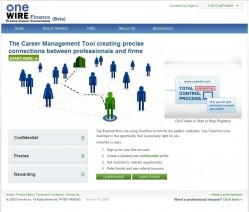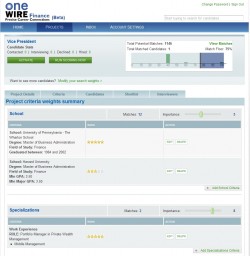Holding a job in the world of finance today is a bit of a high-wire act, so it may be apt that a new site to help financial companies and candidates connect is calling itself One Wire.
 As finance jobs dry up, and layoffs spread like an Australian wildfire, recruiters with the few reqs that do come along are all but drowning in applications. But use OneWire and the best matching candidates surface.
As finance jobs dry up, and layoffs spread like an Australian wildfire, recruiters with the few reqs that do come along are all but drowning in applications. But use OneWire and the best matching candidates surface.
OneWire is job matching for the finance sector. It works on brute force, getting as granular in its data collection as asking for GPA scores, and details about the specific size and reach of the deals an experienced financier handled or an analyst covered.
Almost no detail of a job is too small for OneWire. You complete a personal profile by picking from pulldown menus that beget other pulldowns, which beget still more until OneWire can almost figure out which office on which floor of which skyscraper on Wall Street you worked.
 Marc Karasu, OneWire’s VP of marketing, likened it to eHarmony during a demo last week. OneWire, he was saying, “gets incredibly deep for the industry sectors,” thus “improving the quality of a match.”
Marc Karasu, OneWire’s VP of marketing, likened it to eHarmony during a demo last week. OneWire, he was saying, “gets incredibly deep for the industry sectors,” thus “improving the quality of a match.”
So if a recruiter was looking for a Harvard graduate with international banking experience in the pharmaceutical mid-caps who was on the college crew team (a not uncommon request in finance reqs, Karasu insists), and speaks fluent Mandarin OneWire will deliver up all matching candidates and score them. Some of the attributes can be prioritized, but if you specify Mandarin, you get Chinese speakers or no one at all.
This is not revolutionary technology. No magical algorithms here. The system isn’t going to infer skills the way, say, an IT matching site might intuit web programming skills for a developer who lists Ruby on Rails experience. It’s therefore in a candidate’s best interest to be as thorough as possible. Ditto for the recruiter, who can’t simply upload a posting from the ATS and expect full value. But then, OneWire isn’t about job postings. In fact, there’s no search box; no job listings to browse. A job is either a match or a candidate never hears about it.
“Once a profile is complete,” Karasu explains, “There’s nothing more for them to do.” At another point in the demo, he says, “You might never hear from OneWire for a week, a month, a year. Until a job matching your criteria comes up you won’t hear from us.”
So new it’s still in beta, OneWire is the product of F.S. von Stade & Associates and its founder and president F. Skiddy von Stade. FSvS is one of the leading search firms for the finance industry. OneWire was conceived long before the sector meltdown became obvious. With financial backing from FSvS and executives of the firm’s clients, it took a year to develop and launch OneWire.
The challenge, Karasu acknowledges, is to get candidates to participate. Just like at eHarmony, completing a profile takes time. He says 15-20 minutes; our experience was 30 minutes. For that reason the finance industry meltdown may have been the best thing to happen to OneWire. With thousands of talented financiers on the bricks, there’s plenty of motivation, not to mention the free time, to build a profile. The larger the profile database, the more likely that crew rowing, Mandarin-speaking, Harvard alum with the global pharma experience will be in there.
It also helps that some of the firm’s client companies are beta testers, referring applicants to their career center to OneWire. FSvS candidates must also complete profiles.
 In addition, OneWire has a team contacting business schools across the country to get their students to complete profiles. Karasu tells us that OneWire will also be reaching out directly to prospects, including those currently employed, who, in a different environment, might not even consider participating.
In addition, OneWire has a team contacting business schools across the country to get their students to complete profiles. Karasu tells us that OneWire will also be reaching out directly to prospects, including those currently employed, who, in a different environment, might not even consider participating.
Individual referrals will also drive more profiles, since candidates who are a match for a job, but choose not to pursue it, can refer others. If one of their referrals gets the job, the hiring company pays a bounty, which, Karasu says, can often be in the $30,000 range. That’s enough cash to interest even secure, senior financial executives.
Our demo of OneWire convinced us that as a career center tool it has great potential. If a UBS (one of the beta testers) insisted that all applicants complete profiles, it would have a database far more detailed than any uploaded resume will provide. However, getting passives to spend the time manually entering all their data would be an enormous challenge, but for the catastrophic sector meltdown.
The most serious shortcoming — no deal killer, but a definite annoyance — is that a recruiter can’t source by company. Not that it couldn’t be done; OneWire simply chose not to allow it. We also felt the weighting of the criteria isn’t as robust as we’d like. You can scale back the importance of that college rowing experience, but we saw no way to assign a weight to each element of a job req.
It’s also unclear at this stage how a OneWire candidate gets exported into a local ATS. Karasu says OneWire enables it, but that the system has its own CRM, scheduling tools, and other ATS features so it can replace that bit of technology. We rather doubt that’s going to happen for the larger firms, but, as Karasu pointed out to us, there are plenty of smaller financial firms and banks across the country who will appreciate the convenience of those features.
Still, with the economy wreaking havoc in so many areas, OneWire has interesting growth prospects. Karasu says other industries are on the horizon, declining to say which they might be. But it’s not too hard to guess. Our bet? Lawyers are next.